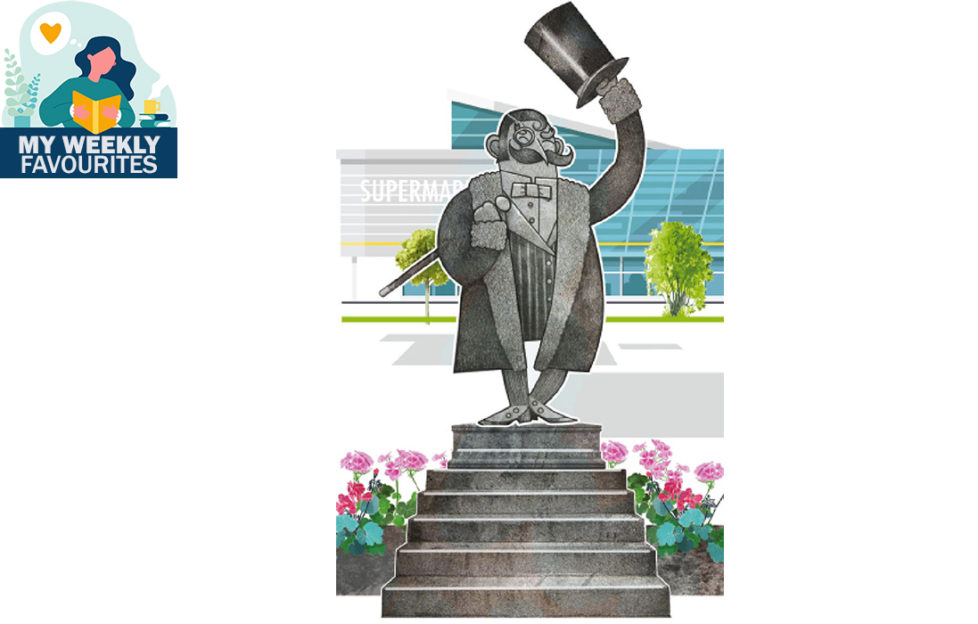Planning Permission

Can a philanthropist help Maisie from beyond the grave?
They’d done a wonderful job, thought Maisie.
Lovely flowering tubs; pride-of-place statue of Walter Millet – local do-gooder and philanthropist, who lived on in memory if not in the flesh. Whoever would have thought it?
“A supermarket! No way,” George roared, when hearing news of the plans.
“Handy for me,” Maisie said, regretting her words as George’s face began to turn a deep bluey-purple.
“You?” George crashed his hand down on the table, spilling his coffee across the lovely, hand-embroidered tablecloth she’d made; darkening the carefully stitched blue forget-me-nots to a hue not at all dissimilar to the colour of his face.
She’d reached for her sewing, ducked her head and stitched.
She’d done it for most of her married life, silently creating beautiful napkins, tablecloths, tray cloths – anything, really. While George ranted and raved, she stitched.
It hadn’t been much of a life at all. They never did anything together. No holidays, no evenings out, he wouldn’t even accompany her to the shops.
Family and friends had slowly but surely disappeared from her life.
George carried on as he always had, riding roughshod over everyone; driving to the village station every morning, leaving his car in the car park, before catching the train to the city to take great pleasure in a job that pushed through commercial plans without thought for ordinary people affected by his decisions.
“They’ll devalue MY property,” he thundered. “They’re not tearing this investment from under my feet!”
Their home, Maisie assumed.
He tried to rally support from the locals, but the memory of his involvement in the knocking down of the local community hall in the next village hadn’t faded.
“Sentiment can’t stand in the way of progress,” he’d said at the time.
The absence of opposition by villagers to the proposal for the supermarket meant building began almost immediately.
Maisie loved watching the diggers, the trucks; the laughing workmen. Seeing how things could change.
The plan came into her mind like a gift one Wednesday evening.
While George snoozed, her heart almost bursting, she slipped outside.
George returned home late on Thursdays. The station ticket office was always closed when the city train pulled through.
George’s face was set hard when he finally arrived home.
“I’ve had to walk two miles from the train,” he rumbled. “Useless car wouldn’t start. No taxis in this dead end of a village.”
She’d felt a small glow of satisfaction. Draining the petrol tank so there was just enough for the journey to the station, and nothing left for the journey back home, had been a great idea.
“Maybe you’d like a nice whisky, to soothe you, before we eat.”
She’d poured a very large measure, followed by a second as soon as he’d swigged off the first. He’d pretty much taken care of himself after that, topping up his glass at intervals.
“I see they’re putting up a statue in the forecourt,” she offered, when George started to look a little hazy. “Just across from our garden.” She pointed. “Walter Millet, the reformer…”
“Millet!” George’s fury surged. In seconds he was over at the window. “Over my dead body. I’m not having him staring at me every time I look out of my window.”
“But he was such a nice man…”
“Nice man! Nice man!” George almost choked on the words. “Do-gooder. No sense of what’s important!” He staggered.
“Good deeds and kindness make the world a better place…” Maisie began.
George swung round. “Country wouldn’t be in the state it’s in if it wasn’t for the likes of… of…
“Show me where,” he said. “Show me.”
It hadn’t taken much, really. The dark night, George’s tiredness, the effects of the whisky. Maisie knew the building site well, the layout imprinted on her mind.
Poor George, he’d just stumbled backwards, hardly making a sound as the still-wet cement sucked him under.
He only had himself to blame; demanding to know the exact location of the statue.
She’d been interviewed by the police, of course, but embroidering the truth had been easier than she imagined.
“Happens all the time, madam,” they told her, after they concluded their investigations. “We’ve more names on our missing persons files than most of us have had hot dinners.
“The only thing we know, given that we found your husband’s car in the station car park, is that he never returned from the city.”
Staring up at Walter Millet’s statue, Maisie couldn’t help but smile.
Funny, the way things turned out; George was always at the shops with her now.
Millet, champion of the underdog – the man who found, fought for and won causes believed to be lost – ensuring George was finally kept firmly in his place.
George, who said sentiment couldn’t stand in the way of progress.
He’d been right. She’d taken his advice.
She reached for a shopping trolley, giving Millet a conspiratorial wink. And she’d have sworn he winked back.
Don’t forget – you can find brand new short stories every week in My Weekly magazine! Subscribe now for a great money-saving deal.




